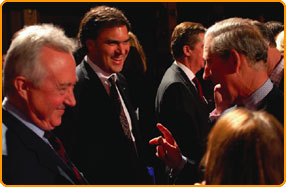Governance
Corporate social responsibility - Doing the right thing in the workplace
Bradford & Bingley's employment practices continue to reflect the human rights standards enshrined in the United Nations Universal Declaration of Human Rights and the International Labour Organisation Conventions. These cover such items as minimum working age, working hours, health and safety and discrimination.
During 2007, Bradford & Bingley continued to roll out its culture and values programme. This nurtures a culture of working together across departments and functions within the Company, with a focus on reaching every member of staff as well as obtaining objective feedback across the Group.
The staff satisfaction survey ran quarterly throughout 2007 and, in addition to reporting on the Group level results, managers received feedback on their teams.
We have also incorporated a score for the 'feel-good' factor, incorporating such questions as how likely staff would be to recommend Bradford & Bingley as a place to work and whether they feel the Company has changed for the better in the last twelve months. The feel-good factor has remained constant at 79% this year, which demonstrates that the culture and values programme has remained at the forefront of people's behaviours. This is a significant increase on the feel-good factor of 58% in 2005 before the culture and values programme was rolled out (2006: 78%).
The response rate for the survey continues to increase and is now up to 82% (2006: 72%).
 Bradford & Bingley has an in-house training
facility, The Bradford & Bingley Academy,
designed to proactively work with people
in both career and personal development.
Bradford & Bingley has an in-house training
facility, The Bradford & Bingley Academy,
designed to proactively work with people
in both career and personal development.
In 2007, the Academy delivered the majority of employee training, including two major courses for managers. Team managers within operations functions and branch managers have been able to attend a two day training module on the manager as communicator to enhance their communication and mentoring skills. Branch managers have also benefited from a two day training module on the importance of good customer service and ways to improve delivery.
Bradford & Bingley operates in different communities across the UK and we understand the benefits of diversity to our business.
Our workforce should reflect the communities in which we live and work, and our employment practices help us to deliver on this goal. We promote diversity and equality across all aspects of working life and we believe it is important to share best practice and success. We provide the opportunity for all staff to develop their skills and knowledge and to enjoy fulfilling careers.
Bradford & Bingley is a member of the Employers' Forum on Disability, the Employers' Forum on Age and Opportunity Now. These organisations, amongst others, look at ways to promote awareness of disability, age, race and gender within the workplace.
Bradford & Bingley recognises that a diverse workforce gives the Company a wider range of experiences and helps us to respond better to the needs of our customer base. We take our commitment to diversity seriously and have a named Board Director, Robert Dickie, responsible for diversity issues and reporting.
Women occupy 47% of management roles (2006: 47%) and 26% of senior management roles (2006: 35%) within the Group.
Ethnic minorities occupy 7% of management roles (2006: 5%) and 5% of senior management roles (2006: 6%). In 2007, 10% (2006:10%) of the total workforce are from ethnic minorities, a figure that is representative of the UK workforce as a whole.
Analysis of workforce by percentage
| 2007 | 2006 | 2005 | 2004 | 2003 | |
|---|---|---|---|---|---|
| Women (overall) | 66% | 66% | 65% | 65% | 61% |
| Women (management) | 47% | 47% | 45% | 44% | 36% |
| Ethnic minorities (overall)* | 10% | 10% | 10% | 11% | 13% |
| Ethnic minorities (management)* | 7% | 5% | 5% | 7% | 9% |
| Value of training | £2.4m | £3.3m | £1.5m | £1.6m | £7.2m |
| Value of training per staff member | £746 | £1,021 | £492 | £501 | £929 |
| Percentage of staff represented by recognised trade union ('UBAC') | 45% | 45% | 52% | 46% | 40% |
| Percentage of staff participating in Sharesave scheme | 37% | 35% | 39% | 52% | 52% |
* currently 28% of staff records do not have an ethnic origin recorded. Figures for the 72% of staff records with ethnic origin recorded have been grossed up to represent 100% of staff for comparison purposes.
 Bradford & Bingley's main partner in
incorporating diversity across the business is
Quest for Economic Development ('QED') which
is a Bradford-based organisation set up to
support the South Asian community within the
UK. However, since its inception in 1990, QED
has worked with many FTSE100 companies
and government departments to promote the
benefits of diversity within the workplace.
Bradford & Bingley's main partner in
incorporating diversity across the business is
Quest for Economic Development ('QED') which
is a Bradford-based organisation set up to
support the South Asian community within the
UK. However, since its inception in 1990, QED
has worked with many FTSE100 companies
and government departments to promote the
benefits of diversity within the workplace.
We are also concerned about the health and wellbeing of our employees, recognising that this is vital to our business. We have comprehensive policies agreed with the recognised staff union ('UBAC') on Flexible Working and Fair Treatment at Work. We continue to offer a confidential counselling service, provided free of charge to employees and their families, to enable discussion of any issue affecting their lives, at work or at home.
Our Flexible Working Policy is available to all staff, not just those with children under six or disabled children under eighteen, which is the legal requirement. For Bradford & Bingley, flexible working incorporates a wide variety of working practices and can be any working pattern other than the normal one.
Bradford & Bingley was awarded the 'two ticks' symbol by the Employment Service in June 1995. This recognises our commitment to people with disabilities. Using the 'two ticks' symbol means we are working towards the guidelines in the Employment Service Code of Good Practice on the Employment of Disabled People.
The symbol is used in our job advertisements and application forms to make it clear to potential applicants with a disability that we welcome their application on the basis of their abilities and will interview all applicants with a disability who meet the minimum criteria for the role.
We have induction loops in all branches, and have improved wheelchair access and introduced power assisted doors across the branch network. The Royal National Institute for the Deaf ('RNID') provide interpretation services for our customers and we provide sign language, lip speaking, deafblind manual interpretation, speech to text interpretation and a notetaking service. In addition, customers can access our products via RNID's Typetalk service.
Bradford & Bingley is also committed to ensuring accessibility across our product range and we continue to provide customers with literature in different formats, such as Braille, audio and large print. Our corporate and customer-facing websites have been audited by the Royal National Institute for the Blind ('RNIB') to ensure that they are as user-friendly as possible.
Bradford & Bingley has a legal and moral responsibility for the health and safety of its staff and members of the public where they are affected by its business.
We review our Health & Safety Policy Statement on an annual basis at Board level and the policy is updated every January. A full copy is issued to every branch and department.
Robert Dickie, Group Operations Director, is the nominated member of the Board of Directors responsible for Health & Safety and chairs the Group Health & Safety Committee.
In addition, Bradford & Bingley operates a dedicated Health & Safety Advice Line for any member of staff to request information or advice from the Health & Safety Team. This is accessible by telephone, fax or email.
One of the most significant risks associated with the Group's operations is the safety and health risks associated with bank raids. Thankfully, these events are rare and have reduced over the past decade. In 1998, Bradford & Bingley suffered 38 raids but in 2007, we suffered 10.
One of the main reasons for this decrease is the Group's ongoing work on improving its security measures. The Group is a member of the Raid-control Trust (www.raid-control.org), a crime reduction initiative that aims to raise security standards in retail premises, thereby reducing the potential for commercial robbery and creating safer working environments.
In 2007, we invested in new security systems in all branches to bring them up to the Raidcontrol standard, a significant commitment by the Group.
In 2006, we reported on the work done by Bradford & Bingley to develop an action plan on managing the health effects of work-related stress. We are pleased to report that in 2007, we have seen significant reductions in the levels of stress-related absence.
Stress-related absence at Bradford & Bingley is in line with industry levels but the financial sector has been identified by the Health & Safety Executive ('HSE') as an action area for stress management.
Our bespoke Stress Management Plan combines risk assessment techniques with information and advice for managers and staff and requires managers to update all risk assessments and action plans on at least, an annual basis.
In 2007, we saw stress-related absence fall by 48% to 480 hours lost per 100,000 hours worked (2006: 916.6 hours). The work done by our Health & Safety department on stress management has been recognised by the HSE as setting best practice in this area and the Group is regularly invited to present a case study at HSE 'Healthy Workplace Solutions' workshops across the UK.
One of the challenges in operating a national branch network is ensuring that health and safety is managed consistently across all of our branches. This is further complicated by the fact that the local authority for each branch is the 'enforcing authority' for health and safety legislation rather than any national organisation.
In recognition of this, the Group signed a Lead Authority Partnership with Bradford District Council in September 2006. The Lead Authority Partnership Scheme ('LAPS') sets out to raise the standard of health and safety management in a business by partnering with one local authority. That local authority then becomes the focal point of liaison on health and safety issues between other local authorities, the Health & Safety Executive and Bradford & Bingley.
In 2007, our Lead Authority Partnership with Bradford District Council enabled us to apply consistent interpretations of health and safety policy across our branch network. This led to increased compliance with health and safety as measured by our internal audit teams.
We continue to encourage employees to benefit from the Group's success through share schemes. Currently, 37% of employees hold at least one Sharesave account (2006: 35%), enabling them to save over a period of years with the prospect of buying Bradford & Bingley shares at a discount.
